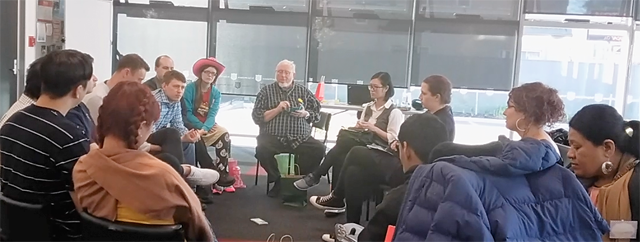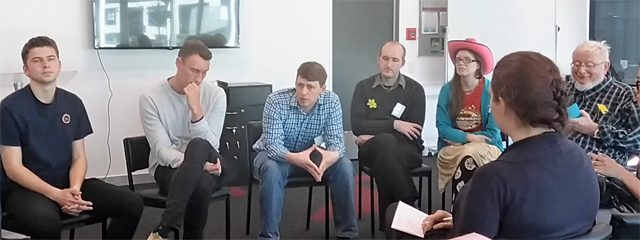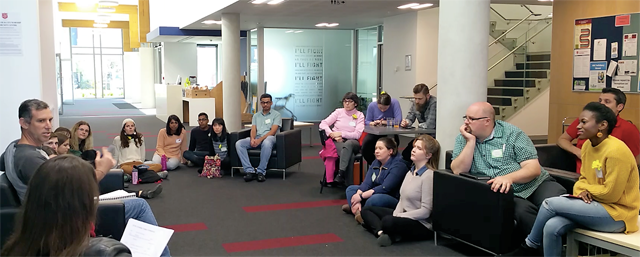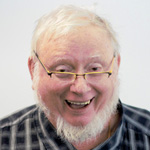
For as long as memory serves, in as many Christian and secular conferences as I can recall, small groups have been part of the agenda. Usually, they are governed by the plenary and questions are posed for small groups to consider.
The process is much the same, after a set time of discussion, they small groups are called back and the speaker calls upon someone from each group to make some relevant comments from their small group discussion.
The idea of this post small group discussion period is to comprehend the answers from each of the small groups and the speaker than draws some conclusions from it all and sums up the process.
Should there be several small group gatherings in the allotted time for the plenary, then this process is followed for each set small group discussion period. We've all done it, we all know the scenario and many enjoy this kind of participatory involvement.
Alas, there are some drawbacks to such small group scenarios. Moreover we have all experienced these as well. The conference small group experience can have the following so very typical personality outcomes:
The shark - dominates the discussion
The lion - attacks counter views
The crocodile - consumes the quieter ones
The dreamer - not with it
The antagonist - disagrees to disagree
The bored - doesn't want to be there
The eager - super keen
The cool - loves being seen to be seen
But perhaps the small groups you have experienced have all been the 'eager' types and everyone has made a super brilliant contribution.
Overall, there is a broad mixture of the above in any small group conference meet, and whether it is a work place conference or a Christian conference, the leader works with what they have and generally a reasonable consensus is arrived at.

Finding our Collective Voice
The past two Press Service International young writer conferences, The NZ young writers conference in Wellington held in April and the annual awards conference held on the Gold Coast in September, saw Sophia Sinclair run a workshop plenary titled “Finding our Collective Voice”. At each conference small groups met to discuss the following
- Style
Personal, confessional blog style writing is an increasingly popular form of journalism. The big challenge of blog/comment style writing is resisting the temptation to be overly self-focused. We need to work hard to keep our articles relevant and timely.
- Diversity of background/experiences
Christian Today provides a great platform for us to express our diversity in allowing us to write about whatever takes our fancy. As a result our writing brings freshness, flexibility and individuality to the site. While our diversity of experience is a great strength there is also a challenge to stay unified and connected so we operate as a collective. Working in isolation is great for diversity, but not so great for collaboration.
- Good co-ordination
Former young writer chief editor Sophia Sinclair said at each: The young writers program is one of the most successful inclusions of Gen Y in a writing ministry I've observed. At the conference in Melbourne last year one of the young writers thanked Mark for his hard work in coordinating the writers. She pointed out how hard it is to organise and coordinate volunteers and any of you who have had to co-ordinate helpers at church or for sports teams will know this to be true!
These New Zealand and Australia day conferences help us to link together and get to know each other better. These conferences help us to rise to the challenges we face as a collective. As I said earlier – who we are comes from who we as a collective see ourselves to be.
Finding Our Individual Voice
We’ve discussed who we are as a collective, but I want to spend a bit of time looking at who we are as writers – as individuals. One of the great strengths I mentioned earlier is our diversity of age and experience. I want you to think about your overall writing voice. Voice is the distinct personality, style, or point of view of your work.
You probably have writers you love to read, and other writers you can't stand because their tone is unappealing to you. Mark says he views our writing as targeted towards our peers and views our writing as our way of showing that it’s possible to be a follower of Jesus and remain a thinking sensible person. This allows us to explore further and reveal more of ourselves – our queries, doubts, hopes and expectations.

Finding Focus in Our Work
We’ve all been there – you get the notification to say your article is due and you have nothing. The feeling of panic. Then hours of endless internet “research” and finally you settle on something! I thought we could use the remainder of the time to discuss some article ideas and brainstorm together.
After two conferences
There was a discussion after the Gold Coast small groups met as a comparison between the New Zealand small group sessions and this one, and it seemed to me as though the Australians answered with a 'rawness' (typically Aussie – does it work) whereas a Sophia noted, the New Zealanders came at it with an intellectualism.

The small group outcomes were nonetheless positive and helpful in this whole new arena of having Gen Y expressing their own voice in such a format as Christian Today provides this young writer program.
 Dr Mark Tronson is a Baptist minister (retired) who served as the Australian cricket team chaplain for 17 years (2000 ret) and established Life After Cricket in 2001. He was recognised by the Olympic Ministry Medal in 2009 presented by Carl Lewis Olympian of the Century. He mentors young writers and has written 24 books, and enjoys writing. He is married to Delma, with four adult children and grand-children. Dr Tronson writes a daily article for Christian Today Australia (since 2008) and in November 2016 established Christian Today New Zealand.
Dr Mark Tronson is a Baptist minister (retired) who served as the Australian cricket team chaplain for 17 years (2000 ret) and established Life After Cricket in 2001. He was recognised by the Olympic Ministry Medal in 2009 presented by Carl Lewis Olympian of the Century. He mentors young writers and has written 24 books, and enjoys writing. He is married to Delma, with four adult children and grand-children. Dr Tronson writes a daily article for Christian Today Australia (since 2008) and in November 2016 established Christian Today New Zealand.
Mark Tronson's archive of articles can be viewed at http://www.pressserviceinternational.org/mark-tronson.html

Dr Mark Tronson - a 4 min video
Chairman – Well-Being Australia
Baptist Minister 45 years
- 1984 - Australian cricket team chaplain 17 years (Ret)
- 2001 - Life After Cricket (18 years Ret)
- 2009 - Olympic Ministry Medal – presented by Carl Lewis
- 2019 - The Gutenberg - (ARPA Christian Media premier award)
Gutenberg video - 2min 14sec
Married to Delma for 45 years with 4 children and 6 grand children